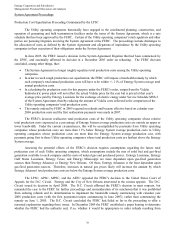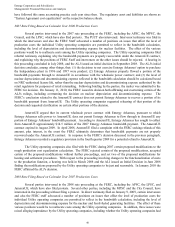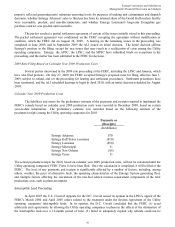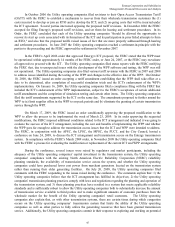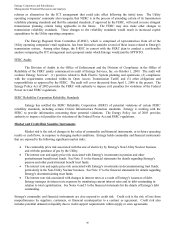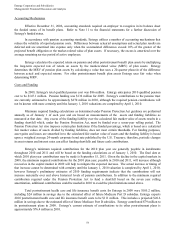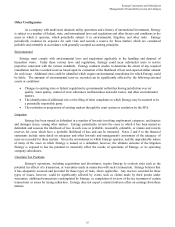Entergy 2009 Annual Report Download - page 47
Download and view the complete annual report
Please find page 47 of the 2009 Entergy annual report below. You can navigate through the pages in the report by either clicking on the pages listed below, or by using the keyword search tool below to find specific information within the annual report.Entergy Corporation and Subsidiaries
Management's Financial Discussion and Analysis
43
In October 2006 the Utility operating companies filed revisions to their Open Access Transmission Tariff
(OATT) with the FERC to establish a mechanism to recover from their wholesale transmission customers the (1)
costs incurred to develop or join an RTO and to develop the ICT; and (2) on-going costs that will be incurred under
the ICT agreement. Several parties intervened opposing the proposed tariff revisions. In December 2006 the FERC
accepted for filing Entergy's proposed tariff revisions, and set them for hearing and settlement procedures. In its
Order, the FERC concluded that each of the Utility operating companies "should be allowed the opportunity to
recover its start up costs associated with its formation of the ICT and its participation in prior failed attempts to form
an RTO," and also that the proposed tariffs raised issues of fact that are more properly addressed through hearing
and settlement procedures. In June 2007 the Utility operating companies reached a settlement-in-principle with the
parties to the proceeding and the FERC approved the settlement in November 2007.
In the FERC's April 2006 order that approved Entergy's ICT proposal, the FERC stated that the WPP must
be operational within approximately 14 months of the FERC order, or June 24, 2007, or the FERC may reevaluate
all approvals to proceed with the ICT. The Utility operating companies filed status reports with the FERC notifying
the FERC that, due to unexpected issues with the development of the WPP software and testing, the WPP was still
not operational. The Utility operating companies also filed various tariff revisions with the FERC in 2007 and 2008
to address issues identified during the testing of the WPP and changes to the effective date of the WPP. On October
10, 2008, the FERC issued an order accepting a tariff amendment establishing that the WPP shall take effect at a
date to be determined, after completion of successful simulation trials and the ICT's endorsement of the WPP's
implementation. On January 16, 2009, the Utility operating companies filed a compliance filing with the FERC that
included the ICT's endorsement of the WPP implementation, subject to the FERC's acceptance of certain additional
tariff amendments and the completion of simulation testing and certain other items. The Utility operating companies
filed the tariff amendments supported by the ICT on the same day. The amendments proposed to further amend the
WPP to (a) limit supplier offers in the WPP to on-peak periods and (b) eliminate the granting of certain transmission
service through the WPP.
On March 17, 2009, the FERC issued an order conditionally approving the proposed modification to the
WPP to allow the process to be implemented the week of March 23, 2009. In its order approving the requested
modifications, the FERC imposed additional conditions related to the ICT arrangement and indicated it was going to
evaluate the success of the ICT arrangement, including the cost and benefits of implementing the WPP and whether
the WPP goes far enough to address the transmission access issues that the ICT and WPP were intended to address.
The FERC, in conjunction with the APSC, the LPSC, the MPSC, the PUCT, and the City Council, hosted a
conference on June 24, 2009, to discuss the ICT arrangement and transmission access on the Entergy transmission
system. In compliance with the FERC's March 2009 order, in November 2009 the Utility operating companies filed
with the FERC a process for evaluating the modification or replacement of the current ICT and WPP arrangements.
During the conference, several issues were raised by regulators and market participants, including the
adequacy of the Utility operating companies' capital investment in the transmission system, the Utility operating
companies' compliance with the existing North American Electric Reliability Corporation (NERC) reliability
planning standards, the availability of transmission service across the system, and whether the Utility operating
companies could have purchased lower cost power from merchant generators located on the transmission system
rather than running their older generating facilities. On July 20, 2009, the Utility operating companies filed
comments with the FERC responding to the issues raised during the conference. The comments explain that: 1) the
Utility operating companies believe that the ICT arrangement has fulfilled its objectives; 2) the Utility operating
companies' transmission planning practices comply with laws and regulations regarding the planning and operation of
the transmission system; and 3) these planning practices have resulted in a system that meets applicable reliability
standards and is sufficiently robust to allow the Utility operating companies both to substantially increase the amount
of transmission service available to third parties and to make significant amounts of economic purchases from the
wholesale market for the benefit of the Utility operating companies' retail customers. The Utility operating
companies also explain that, as with other transmission systems, there are certain times during which congestion
occurs on the Utility operating companies’ transmission system that limits the ability of the Utility operating
companies as well as other parties to fully utilize the generating resources that have been granted transmission
service. Additionally, the Utility operating companies commit in their response to exploring and working on potential
45





